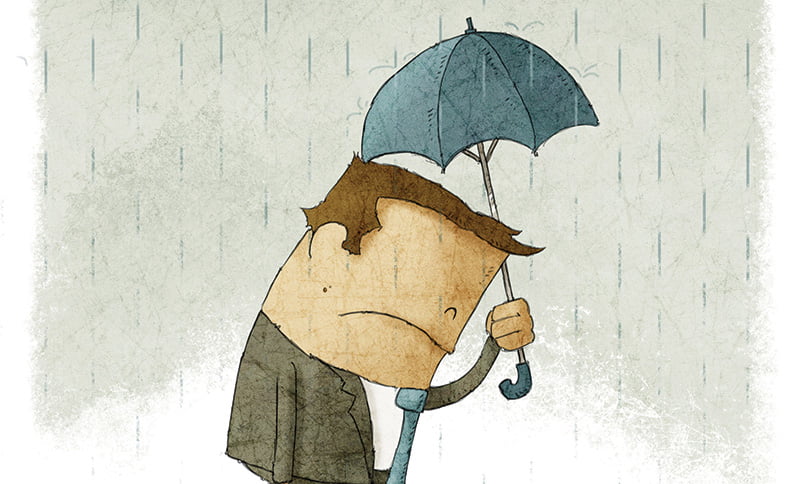or, helping the grieving through the holiday season
by Caitlin Thornbrugh
While the celebrations and traditions encompassing Thanksgiving, Christmas and this time of year can be joyous and beautiful, they can also be some of the most overwhelming and most challenging, particularly for people and families dealing with grief.
“The holidays are, or can be, very stressful times. And dealing with the absence of a loved one due to death, illness, or separation of any kind can add to the stress,” said Sister Loretta McGuire, OSB.
Sister Loretta, a certified grief counselor, offers a five-week group program in the weeks leading up to the holidays at Keeler Women Center in Kansas City, Kansas.
This type of stress might not be something on everyone’s mind, but people who have lost a loved one in the past year, or even in the past five to 10 years, might find this stress to be intense.
“Around the holidays it becomes more poignant because there are traditions they would have with their loved ones,” said Mary Vorsten, MA, LCPC. “For a lot of people who are grieving, the holidays are a more painful time for them.”
Traditions ranging from assembling Christmas tree decorations, to deciding at whose house dinner is held, to the smell of a certain food can all bring up memories.
“People have to be aware that you never know what will trigger grieving,” said Vorsten. “It may be a song or a scent.”
Vorsten described a client’s story of once feeling like her mother was in the room at an office party because someone was wearing the same perfume.
“We have to recognize this person may suddenly be very sad and weepy and we don’t know why,” she said. In this kind of situation, it is best to be supportive and let the person know you are there for them.
Whether you are personally experiencing loss, or in contact with a friend or family member who is processing grief, it’s important to consider the most helpful ways to promote care and healing.
Both Sister Loretta and Vorsten strongly advise simplifying.
“Simplify. Simplify. Simplify. If you’re grieving the loss of a loved one, don’t feel like you have to do all those things you did in the past. You won’t have the emotional energy,” said Vorsten.
This could mean having food prepared from a local grocery store, having a potluck, or eating food that might be considered untraditional holiday food, like barbecue. It could also mean not having a tree, not attending a certain ceremony, or moving celebrations to a new location, even for just a few years.
Speaking from her work experience with bereaved hospice families, Sister Loretta said, “I have learned that it is helpful for families to honor the loved one but not to have everything the same way as in the years past. I learned keeping the holidays simpler is less stressful.”
When redefining holiday traditions, communication across generations is important.
Vorsten described a client telling her adult children she could not attend the annual Plaza lighting ceremony without her spouse, saying she “just wasn’t up for it this year.” It meant so much to her that her children understood.
“Give people permission to do what’s best for them. Say you understand,” said Vorsten.
In some instances, people feel they have to uphold certain traditions for younger children.
Make an effort to reach out to friends and family in this situation. Vorsten indicated this situation as a time when they might need someone else to do the cooking or decorating.
“Finding a new normal means it’s not the old way, but it’s what you’re comfortable with now,” said Vorsten.
As a friend or family member of someone who is grieving, it’s essential to move beyond a feeling of unease with talking about the loss.
“We all have this idea — this idea that they don’t want to talk about it — but that’s our discomfort with bringing it up,” said Vorsten. “It’s very rare in my experience that someone won’t want to talk.”
Time may be a factor in how much the person can or will want to share. In some cases, the more recent the loss, the more painful it is.
“They may struggle to talk about it. They may only be able to cry,” said Vorsten. “But they have someone to sit with them when they’re crying; they need to know we’re praying for them.”
Something specific that can bring up grief during this time of year is attending Mass.
“Religious ceremonies can be very tearful, sad, and difficult to attend,” said Sister Loretta.
“The grieving should give themselves permission to attend or not, and they should let their friends and family know why they are not attending.”
Vorsten advised attending at a different time, bringing a friend, or trying a daily Mass for a change.
“A daily Mass is shorter and [has] a smaller group of people. [It’s] a great way to connect with other people on a daily basis,” she said.
Finally, these conversations should start with the preparations for Thanksgiving.
Approaching the holiday, consider how you can connect and offer help to people who are grieving.
Perhaps most importantly, “don’t leave people alone during the holidays,” said Vorsten.
“Include them in your plans,” she added. “It’s really important for family and friends to reach out and not leave them alone.”







